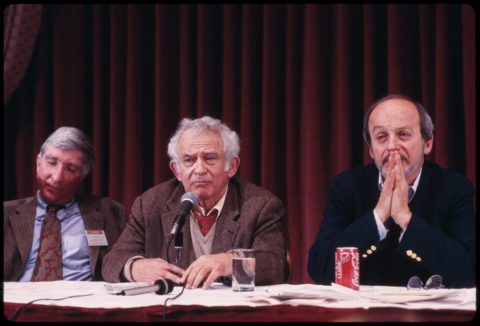In the most recent SHuSH newsletter, Ken Whyte outlines the “cancellation” of the late Norman Mailer by his Random Penguin editors … maybe … but probably not really:

American writers John Updike, Norman Mailer, and E. L. Doctorow at the PEN Congress, January 1986.
Photo by Bernard Gotfryd via Wikimedia Commons.
You have to feel for Norman Mailer, the late author of some forty books and a two-time winner of the Pulitzer Prize. There he lay, resting in well-deserved peace in the winter quiet of Provincetown Cemetery after a lifetime of fighting mankind’s greatest causes — civil rights, an end to war, the Great American Novel, his urgent libido — when out of nowhere comes a report that he has been canceled by his long-time publisher, Random House.
“With slow-mo hammer-dropping predictability,” wrote Michael Wolff in the newsletter, The Ankler, “Norman Mailer’s long-time publisher has recently informed the Mailer family that it has canceled plans to publish a collection of his political writings to mark the centennial of his birth in 2023, confirms the film producer Michael Mailer, the author’s oldest son.”
The reasons for the cancelation, according to Wolff, are “a junior staffer’s objection to the title of Mailer’s 1957 essay, ‘The White Negro’, a psycho-sexual-druggie precursor and model for much of the psycho-sexual-druggie literature that became popular in the 1960s. A Random House source also cites the objections of feminist and cultural gadfly Roxane Gay.”
Wolff’s scoop was promptly picked up and carried at face value all over North America, throughout Italy by La Repubblica, England by the Daily Mail, Chile by El Periodisto, and so on. It was the biggest cultural story going for several days, never mind that questions as to its veracity were raised almost the minute it broke.
Well, before it broke, in fact. Wolff himself scarcely seems convinced of his story. Yes, his headline is unequivocal: “Michael Wolff on Random House’s Cancelation of Norman Mailer”. But he admits in the newsletter that he couldn’t get anyone at Random House to confirm the news. Also that the Mailer estate didn’t actually have a contract for a book of political non-fiction with Random House for the publisher to cancel.
Wolff further allows that his one source at Random House steered him into a ditch, claiming that in addition to the anonymous junior staffer, Roxane Gay was involved. Wolff followed up with Gay, who told him she knew nothing of the controversy and had never read Mailer.



